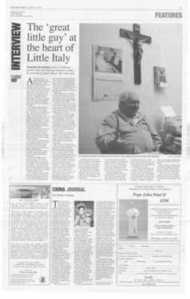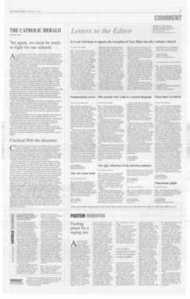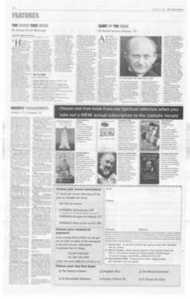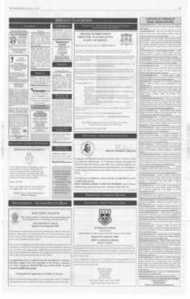Page 12, 11th January 2008
Page 12

Report an error
Noticed an error on this page?If you've noticed an error in this article please click here to report it.
Tags
Share
Related articles
Anti-semitism Condemned
Closing The Book Of The Dark Past
'them And Us'
'protect Israel From Arabs'
Notes And Comments
Strange bedfellows in the fight for the end of time
Israel's new allies are anti-Semitic evangelicals who believe that two-thirds of all Jews must die. Ed West looks at this strange new alliance which has risen under the shadow of 9/11 Allies for Armageddon by Victoria Clark, Yale University Press £18.99 Just as anti-Semites are by and large oddballs. Philo-Semitism often attracts those of various shades on the eccentricity spectrum. Take Clyde Lott, a Mississippi Pentecostal preacher and cattle breeder who recently shipped out 50,000 Red Anguses to Israel because, according to prophecy, the Temple in Jerusalem cannot be rebuilt without them. Then there is Sha Stephens, continuing his father's doomed mission to find oil in Israel; and David Koresh, the former Vernon Howell, who proclaimed himself son of God and died in the 1993 Waco siege, and was afterwards buried in the Israeli flag.
Some 30 million Americans consider themselves Christian Zionists: passionate believers in the state of Israel as a necessary tool for Armageddon. And Victoria Clark, a self-confessed "secular humanist relativist liberal" from Britain, does a remarkable job of explaining where they came from and why they exist.
It all started with the Geneva Bible; in 1589 Elizabeth I had a Cambridge "doctor of physick" named Francis Kett burned at the stake for a suspiciously Jewishsounding belief that Jesus was not God but man. A decade later John Traske was fined £1,000, whipped publicly, had his ears nailed to the pillory and his forehead branded with a J, for "Judaiser", after he forbade his followers to eat black pudding. But what was then called "Judaising" would become more mainstream as low-church Protestants moved ever more towards the Old Testament.
In 1621 Sir Henry Finch wrote The Worlds Great Restauration, predicting a future Jewish state in Palestine and mass conversion to Christianity, a central theme of Christian Zionism and at the heart of the awkward relationship with the Israelis. For the Rapture to happen the Jews must convert en masse to Christianity in their restored land. The provision that two-thirds of Jews must then die is the unwelcome small print. So, was Finch a sympathetic Philo-Semite, or were the Jews just instruments for his apocalyptic visions? Throughout history Christian Zionists have often been, paradoxically, anti-Semites.
By the 19th century the restoration movement was gaining momentum. Unitarians, whose ideas would once have seen them branded as "Judaisers", were especially keen: American president John Quincy Adams fantasised about leading 100,000 Jews into Palestine, while Charles Prestwich Scott. editor of the Manchester Guardian for 57 years, did more to promote Zionism than any other Englishman.
Another influential figure was the professor of Hebrew and Oriental Literatures of New York University, who in 1844 published an influential work on Bible prophecy, Valley of Vision, in which he argued for the forcible, man-made restoration of God's chosen people to Palestine. His name was George Bush. and, yes, he was an ancestor of the current president.
By 1917, when Arthur Balfour made his famous declaration, Zionism had become a political reality. Balfour, typically, was both a Zionist and anti-Semite; he thought Christianity's debt to Judaism had been "shamefully ill-repaid", but he also claimed to be instinctively antiSemitic. Colonel Richard Meinertzhagen, General Allenby's chief of military intelligence, was an ardent Zionist, but admitted to being "imbued with anti-Semitic feelings and even to wishing Zionism did not involve Jews".
By the end of World War Two Britain no longer had the strength or will to rule Palestine, nor did it have much religious zeal left. Zionism was just one more imperial legacy left to its successor state.
The American variety really developed in the 1960s and 1970s, out of a millennial milieu that was partly a reaction to the counterculture. Israeli politicians actively lobbied for support from the likes of Jerry Falwell and Pat Robertson, cheerleaders for a traditionally antiSemitic portion of society, the religious Right. This made for strange bedfellows, yet Falwell and co were so charmed that they even began to talk of America as a "Judeo-Christ ian" nation. And, after the 1967 war, conservatives saw Jews in a new light: not as Leftish urban intellectuals, but as Old Testament warriors with Uzis (while those on the Left now viewed Israel, and so the Jews, as instruments of western imperialism). September 11 drastically upped the ante; Israel, the most implacably anti-Islamic state on earth, wins the "my enemy's enemy" test with flying colours.
Likewise, Iran's nuclear programme, led by a man with a correspondingly apocalyptic view of the world, seems to point towards a fresh holocaust.
The Christian Zionists enthusiasm for Israel is especially bizarre as it often comes at the expense of Christian Palestinians, a community which has suffered from extremists on both sides. It is also shameful the way the Israelis court this bloc, and let religious groups in the West Bank sponge off their Christian fans; not only are these settlements unjust, but the subsidies have created that most un-American of sins: welfare-dependency.
But as the Israelis say themselves: how many supporters do they have? It says much about the dire situation they are in that Israel's biggest Gentile friends in the world believe that two thirds of them must die.
Even those who consider themselves well disposed towards Israel will find this book as disturbing as it is fascinating, a real eye-opener to Christian, Jew and atheist alike.
blog comments powered by Disqus
















